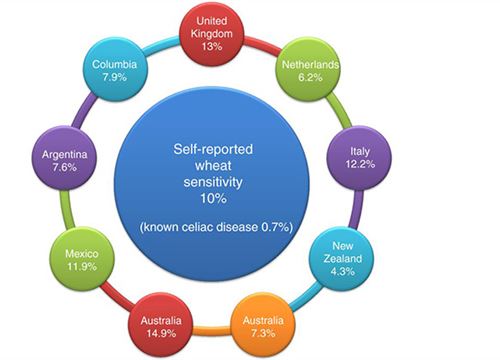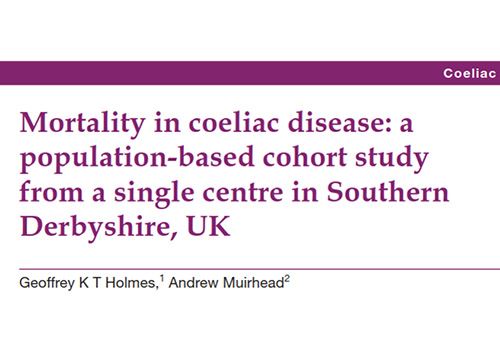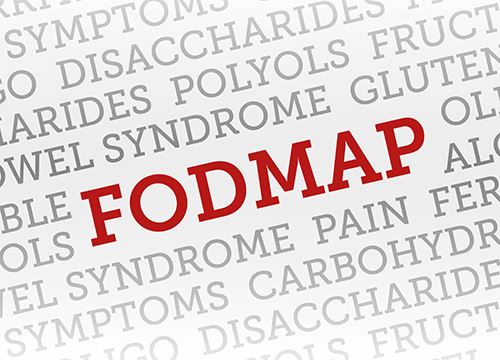Latest research
Here we provide you with a selection of research paper summaries from the latest medical journal publications. To view more research summaries, visit our clinical library.

Systematic literature review of the economic burden of coeliac disease
The prevalence of coeliac disease (CD) has rapidly increased over recent decades, but costs related to CD remain poorly quantified. The purpose of this systematic review was to assess the economic burden of CD in North America and Europe.
Read more...

Spanish Consensus on Exclusion Diets in IBS
A consensus document on role of exclusion diets in IBS has been developed to help facilitate dietary counselling in daily practice.
Read more...

First Rare Disease Collaborative Network on Refractory Coeliac Disease commissioned
Refractory coeliac disease, a deadly form of the condition, has received its first dedicated support from NHS England with the setting up of a Rare Disease Collaborative Network (RDCN) in order to accelerate research and treatment into this life threatening condition.
Read more...

Headache Associated with Coeliac Disease: A Systematic Review and Meta-Analysis
The most well-known neurological GRDs are cerebellar ataxia and peripheral neuropathy, however clear links between gluten sensitivity (GS)/ coeliac disease (CD) and epilepsy, various movement disorders, and headaches have also been described .
Read more...

Wheat intolerance and chronic gastrointestinal symptoms in an Australian population-based study: Association between wheat sensitivity, coeliac disease and functional gastrointestinal disorders
Potter MDE, Walker MM, Jones MP et al. American Journal of Gastroenterology 2018; 113(7):1036-1044
A significant proportion of the global population, without a medical diagnosis of coeliac disease (CD) or wheat allergy, avoid gluten or wheat in the diet. A prevalence of self-reported wheat sensitivity (SRWS) of between 4% and 13% has been shown.
A significant proportion of the global population, without a medical diagnosis of coeliac disease (CD) or wheat allergy, avoid gluten or wheat in the diet. A prevalence of self-reported wheat sensitivity (SRWS) of between 4% and 13% has been shown.
Read more...
04.10.2018

Clinical Applications of Dietary Therapies in Irritable Bowel Syndrome (IBS)
Rej A, Avery A, Ford AC et al. J Gastrointestinal Liver Disease. 2018; 27 (3): 307-316
Over the last decade, there has been renewed interest in the role of dietary therapies in IBS. Both the British Dietetic Association (BDA) and National Institute for Health and Clinical Excellence (NICE) guidance recommends healthy eating and lifestyle management as first-line advice for IBS.
Over the last decade, there has been renewed interest in the role of dietary therapies in IBS. Both the British Dietetic Association (BDA) and National Institute for Health and Clinical Excellence (NICE) guidance recommends healthy eating and lifestyle management as first-line advice for IBS.
Read more...
21.08.2018

Gluten-free diets and specialist products – challenges, myths and progress
We are pleased to report the publication of our most recent Forum journal, a special issue dedicated to the nutritional quality and safety of manufactured gluten-free foods and implications for health and disease.
Read more...
18.07.2018

Influence of low FODMAP and gluten-free diets on disease activity and intestinal microbiota in patients with non-coeliac gluten sensitivity.
Non-coeliac gluten sensitivity (NCGS) is characterised by gastrointestinal (GI) and extra intestinal (EI) symptoms triggered by ingestion of gluten. Symptoms improve on a gluten-free diet and recur after ingestion of gluten-containing cereals. However, the causative role of gluten is still unclear and there is recognition that non-gluten triggers, for example carbohydrate or amylase trypsin inhibitors (ATIs) may be implicated. A reduced-FODMAP diet has also been shown to partially improve GI symptoms in some individuals with NCGS.
Read more...
18.07.2018

The Global Phenomenon of Self-Reported Wheat Sensitivity
There is recognition that the prevalence of coeliac disease, the most commonly recognised gluten-related disorder, is higher than previously thought and is potentially rising. The change in prevalence may be due to increasing immunogenicity of gluten but also through improved diagnosis and a shift in understanding of coeliac disease. In the last ten years, the availability of gluten-free foods and awareness of gluten-related disorders has changed dramatically.
Read more...
18.06.2018

The value and significance of 25(OH) and 1,25(OH) vitamin D serum levels in adult coeliac patients: A review of the literature.
Several studies suggest that newly diagnosed coeliac patients frequently present with low levels of circulating vitamin D, therefore guidelines suggest it’s evaluation at the time of diagnosis.
Read more...
08.05.2018

Mortality in coeliac disease: a population-based cohort study from a single centre in Southern Derbyshire, UK
Following the introduction of reliable serological tests and use of case-finding strategies for coeliac disease (CD), it has been hypothesised that milder cases of the condition might be coming to diagnosis and have a reduced risk of mortality.
Read more...
08.05.2018

Trends, geographical variation and factors associated with prescribing of gluten-free foods in English primary care: a cross-sectional study.
Adherence to a strict gluten-free diet (GFD) is the only effective treatment for coeliac disease and prescribing of gluten-free products for these patients may be associated with better adherence. Currently, there is extensive discussion as to whether gluten-free prescribing is a cost-effective intervention with wide variation in prescribing policies between Clinical Commissioning Groups (CCGs).
Read more...
07.05.2018

Service provision and dietetic reflections on the management of gastroenterology patients.
In December 2017, with the support of the British Dietetic Association, Dr Schär undertook a survey of UK registered dietitians with the aim of gathering information regarding service provision and clinical reflections on the management of patients with coeliac disease and irritable bowel syndrome (IBS).
Read more...
20.04.2018

The importance and challenges of the therapeutic relationship in IBS
Irritable Bowel Syndrome (IBS) is a common functional disorder causing a range of gastrointestinal symptoms. Whilst it does not reduce life expectancy, quality of life can be significantly affected with associated personal, healthcare and societal costs. The aetiology of IBS remains unclear with a range of factors proposed including stress, anxiety, visceral hypersensitivity, gut dysmotility, chronic low-grade inflammation as well as the role of diet and gut flora.
Read more...
19.04.2018

The low FODMAP diet in the management of irritable bowel syndrome: an evidence-based review of FODMAP restriction, reintroduction and personalisation in clinical practice.
Irritable bowel syndrome (IBS) is a debilitating functional gastrointestinal disorder. As dietary triggers are reported to be central to symptom generation in up to 84% of patients with IBS, dietary modification is increasingly employed to help manage symptoms. A low FODMAP diet for the management of functional gut symptoms in IBS has been shown to be efficacious with a clinical response rate in 50-80% of IBS patients. The aim of this review was to provide practical guidance on patient assessment and implementation and monitoring of the low FODMAP diet.
Read more...
28.03.2018

Mixture model analysis identifies irritable bowel syndrome subgroups characterised by specific profiles of gastrointestinal, extraintestinal somatic and psychological symptoms.
Irritable bowel syndrome (IBS) is a functional bowel disorder affecting 10-15% of the population. It has a significant impact on quality of life (QoL) and is also an important cause of healthcare utilisation and absenteeism from work. There is significant overlap with other functional gastrointestinal (GI) disorders and these can be viewed as parts of a functional disorders continuum.
Read more...
08.03.2018

Fermentable short-chain carbohydrate (FODMAP) content of common plant-based foods and processed foods suitable for vegetarian and vegan-based eating patterns
Expansion of the current FODMAP database to provide more food sources of key macro- and micro nutrients for vegetarians and vegans is needed. Furthermore, increased understanding of the opportunity to reduce FODMAP content of plant-based foods via food processing and cooking techniques may also help to improve nutritional adequacy in this patient group.
Read more...

Coeliac disease in children with type 1 diabetes
This review paper summarises approaches to diagnosis and treatment of children with type 1 diabetes (T1DM) and coeliac disease (CD) with a particular emphasis on those with a double diagnosis. Over the last few decades, the incidences of both CD and T1DM have rapidly increased as demonstrated by data from Finland which saw a five-fold increase in T1DM between 1980 and 2011 with a parallel change observed for CD.
Read more...
05.12.2017

The Overlapping Area of Non-Coeliac Gluten Sensitivity (NCGS) & Wheat-Sensitive Irritable Bowel Syndrome (IBS): An update.
NCGS is characterised by intestinal and extra-intestinal symptoms related to the ingestion of gluten-containing food in patients not affected by coeliac disease (CD) or wheat allergy (WA). IBS is characterised by abdominal pain, bloating, gas, diarrhoea and constipation. There is considerable overlap between the IBS and NCGS clinical picture with research supporting the hypothesis that gluten and other wheat components may trigger IBS symptoms. The overlap and absence of IBS/NCGS biomarkers creates a confusing situation. This review article aimed to present 1) an update on the complex relationship between NCGS and IBS and 2) expert opinion on this topic.
Read more...
20.11.2017

Oral Manifestations in Pediatric Patients with Coeliac Disease – A Review Article
The presence of oral lesions and dental defects have been observed amongst coeliac patients at higher frequency compared to the general population and may therefore be an additional tool to aid diagnosis, particularly amongst those patients who present with more atypical or silent forms of CD.
Read more...
13.11.2017

Food and functional dyspepsia: a systematic review
Functional Dyspepsia (FD) is defined as early satiety, post-prandial fullness or epigastric pain/ burning related to meals that interferes with daily activities in the absence of any associated structural or metabolic disease (Rome IV criteria).
Read more...
30.10.2017

A low fermentable oligo-di-mono saccharides and polyols (FODMAP) diet reduced pain and improved daily life in fibromyalgia patients.
Reduction of FODMAPs has been shown to have significant benefits in the treatment of irritable bowel syndrome (IBS). It is reported that 70% of patients with fibromyalgia (FM) suffer from IBS and FM patients report exacerbation of symptoms with certain foods, with a proportion attempting to control symptoms via dietary restriction.
Read more...
03.10.2017

Coeliac disease in infants: antibodies to deamidated gliadin peptide come first!
The onset of coeliac disease (CD) in the first year of life is uncommon and the diagnosis can be challenging due to the suboptimal sensitivity of tissue transglutaminase antibodies (tTG) at this age and the many other possible causes of malabsorption in infants.
Read more...
02.08.2017

Adherence to a Gluten-Free Diet is associated with receiving gluten-free foods on prescription and understanding food labelling
The only treatment for coeliac disease (CD) is a strict lifelong gluten-free diet (GFD). Adherence to the diet can be challenging and reported rates vary from 36% to 96%. Adherence is associated with a range of different factors including availability and cost of manufactured gluten-free (GF) versions of wheat-based products. The current trend for restriction of GF prescriptions, along with higher costs and limited availability in supermarkets, could lead to long-term health risks for people with CD, through dietary non-adherence.
Read more...
10.07.2017

Early growth in children with coeliac disease: A cohort study
This study aimed to investigate whether growth in the first 2 years of life differs between children later diagnosed with coeliac disease and children without the diagnosis in a large, prospective birth cohort.
Read more...
04.07.2017

Fermentable carbohydrates (FODMAPs) exacerbate functional gastrointestinal symptoms in patients with inflammatory bowel disease: a randomized double-blind, placebo controlled, cross-over, re-challenge trial.
The aim of this study was to conduct a randomized, double-blinded, placebo-controlled, cross-over, re-challenge trial, designed to compare the effects of FODMAP challenges to a placebo (glucose) on FGS in patients with quiescent IBD, experiencing co-existent FGS.
Read more...
15.06.2017

Reduced bone mineral density in children with screening-detected coeliac disease.
It is known that low BMD is found in children with clinically-detected coeliac disease at diagnosis and that this is reversed once on a gluten-free diet (GFD). However, the question remains as to whether children identified through screening, often with asymptomatic or subclinical disease, also have low BMD. It is also not known if a GFD influences the development of BMD in this group.
Read more...
09.06.2017

Duodenal biopsies for the diagnosis of coeliac disease: are we adhering to current guidance?
Coeliac disease (CD) can present with a wide range of non-specific abdominal symptoms, alongside a number of atypical symptoms. As a result, it is important to ensure that when CD is a considered as a potential diagnosis, patients are adequately investigated to avoid missed or delayed diagnosis.
Read more...
23.05.2017

Reduced bone mineral density in children with screening-detected coeliac disease
It is known that low BMD is found in children with clinically-detected coeliac disease at diagnosis and that this is reversed once on a gluten-free diet (GFD). However, the question remains as to whether children identified through screening, often with asymptomatic or subclinical disease, also have low BMD. It is also not known if a GFD influences the development of BMD in this group.
Read more...
15.05.2017

Long term gluten consumption in adults without celiac disease and risk of coronary heart disease: prospective cohort study
Concerns exist that a gluten-free or gluten-restricted diet may be nutritionally suboptimal. This prospective cohort study sought to examine the association between long term intake of gluten and the development of incident coronary heart disease (CHD).
Read more...
22.03.2017

FODMAPs: food composition, defining cut-off values and international application
The benefits of a low-FODMAP diet in people with IBS are now well established. The Monash University Department of Gastroenterology has performed extensive work for over 10 years to quantify the FODMAP composition of hundreds of foods. This review paper discusses the criteria for classifying food as low in FODMAPs and the challenges encountered in analysing food for FODMAP content.
Read more...
09.03.2017

Follow-up of patients with functional bowel symptoms treated with a low FODMAP diet
This retrospective, cross-sectional study aimed to investigate patient-reported long-term effects of the LFD, long-term adherence and dietary impact on disease course in patients with IBS and patients with IBD and co-existing IBS treated with the LFD.
Read more...
24.02.2017

Pre-endoscopy Point of Care Test (Simtomax®- IgA/IgG-Deamidated Gliadin Peptide) for Coeliac Disease in Iron Deficiency: Diagnostic Accuracy and a Cost-Saving Economic Model.
Existing data has shown 2.6-8.7% of patients attending endoscopy with anaemia are subsequently diagnosed with CD. However, availability and utilisation of coeliac serology prior to endoscopy appears to be variable. If serology is unavailable, this commits the clinician to take duodenal biopsies; an expensive way of detecting cases. The aim of this study was to evaluate the role of utilising a pre-endoscopy Point of Care Test (POCT) for CD in iron-deficiency in a cost-saving model.
Read more...
02.02.2017

Early recognition of coeliac disease through community pharmacies: a proof of concept study
The aim of the paper is to provide a proof of concept study, which determines the service feasibility and acceptability of providing coeliac screening in a number of community pharmacies to help improve diagnosis.
Read more...
12.01.2017

BMJ debate: Should gluten-free foods be available on prescription?
In this head-to-head article, it is argued that prescriptions improve outcomes for people with coeliac disease with equality of access and the costs of a quick win considered. The opposing side argues that it is a complicated and costly system and that alternatives to prescribing should be considered.
Read more...
18.01.2017

Dietary Treatments in Irritable Bowel Syndrome
This recent article provides a comprehensive overview of the current evidence base of the possible dietary treatments for this patient group, in this evolving area of research. In addition, it suggests that dietitians are uniquely placed to lead and support the development of research in this area and in helping to establish which dietary treatment would confer the most benefit for each individual patient.
Read more...
09.01.2017

Is there a relationship between gluten sensitivity and postural tachycardia syndrome?
Alongside the more classical presentation of coeliac disease, patients with this condition frequently report a range of extraintestinal symptoms, including those that may be related to the autonomic nervous system, including palpitations, dizziness and presyncope (1-3).
Read more...
01.12.2016

Long-term response to gluten-free diet as evidence for non-celiac wheat sensitivity in one third of patients with diarrhoea- dominant and mixed-type irritable bowel syndrome
The aim of the study was to analyse if HLA-DQ2 and DQ8 are suitable markers for the diagnosis of wheat sensitivity (WS) and to evaluate the long-term clinical response to a GFD in a defined cohort of patients with IBS-D and IBS-M.
Read more...
01.12.2016

New NICE Quality Standard on Coeliac Disease supports the provision of gluten-free food on prescription
The National Institute of Health and Care Excellence (NICE) has launched its first Quality Standard on coeliac disease, aiming to drive measurable improvements in the diagnosis, support and health of people with coeliac disease. It also identifies the need to address health inequalities.
Read more...
31.10.2016

Fecal gluten peptides reveal limitations of serological tests and food questionnaires for monitoring gluten-free diet in coeliac disease patients
The purpose of this prospective, nonrandomised, partially blinded, multicentre study was to confirm the clinical usefulness of measuring faecal gluten immunogenic peptides (GIP) as a marker of adherence to a GFD.
Read more...
22.09.2016

Using best practice to create a pathway to improve management of irritable bowel syndrome: aiming for timely diagnosis, effective treatment and equitable care
This pilot project outlines the methods employed in one CCG to successfully develop a cost-effective IBS pathway with reduced secondary care involvement and improvement in patient care.
Read more...
12.09.2016

Randomised clinical trial: the efficacy of gut-directed hypnotherapy is similar to that of the low FODMAP diet for the treatment of irritable bowel syndrome
The aims of the study where to perform a randomised clinical trial in patients with IBS, naïve to dietary or psychological therapies, to compare the effect of gut-directed hypnotherapy with the low FODMAP diet, alone or in combination on symptoms and psychological health over both a short (6 week) and long term (6 month) period.
Read more...
24.08.2016

Intestinal cell damage and systemic immune activation in individuals reporting sensitivity to wheat in the absence of coeliac disease
The results of this study demonstrate the presence of objective markers of systemic immune activation and correlating serum markers of gut epithelial cell damage in individuals who report sensitivity to wheat, rye and barley in the absence of CD.
Read more...
21.06.2016

British Dietetic Association systematic review and evidence-based practice guidelines for the dietary management of irritable bowel syndrome in adults (2016 update)
This paper provides a systematic review of evidence relating to the role of diet in the management of IBS and an update to previous guidelines.
Read more...
21.06.2016

Long-term care for patients with Coeliac Disease: A review of the literature and future directions
National and international guidelines advocate long-term follow-up of coeliac patients to help control ongoing symptoms, facilitate adherence to a GFD and to avoid complications. However, uncertainty exists about the provision of follow-up care. This narrative review evaluates the various methods of follow up and the differing tools used for assessment of dietary adherence.
Read more...
21.06.2016

Patients with coeliac disease reported higher consumption of added sugar and total fat than healthy individuals
The aim of this study was to compare the food and nutrient intake of patients with CD aged between 10-23 years old with non-coeliac controls matched by age, gender and BMI.
Read more...
10.05.2016

Anaemia in pediatric celiac disease: association with clinical and histological features and response to a gluten-free diet
One of the most common manifestations of CD in children in iron-deficiency anaemia. This retrospective study compared a variety of clinical, histological, serological and laboratory findings and dietary response between children presenting with and those without anaemia at CD diagnosis.
Read more...
19.02.2016

Gluten Introduction and the Risk of Coeliac Disease. A Position Paper by ESPGHAN
In 2008, the European Society for Paediatric Gastroenterology, Hepatology and Nutrition (ESPGHAN) made recommendations regarding gluten introduction to the diet of infants, based on observational data. Following the publication of new evidence, ESPGHAN has revised its 2008 recommendations regarding gluten introduction to the diet of infants and the risk of developing coeliac disease (CD) during childhood.
Read more...
www.drschaer-institute.com
